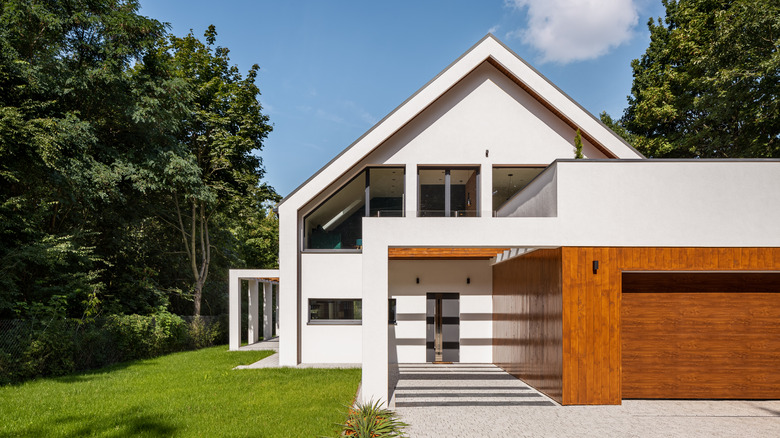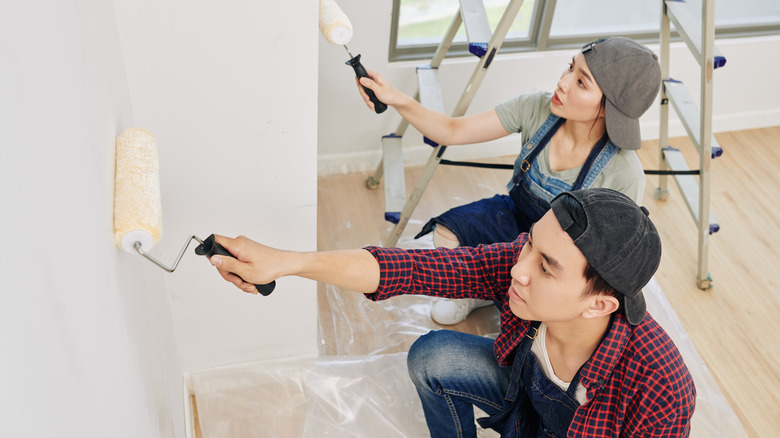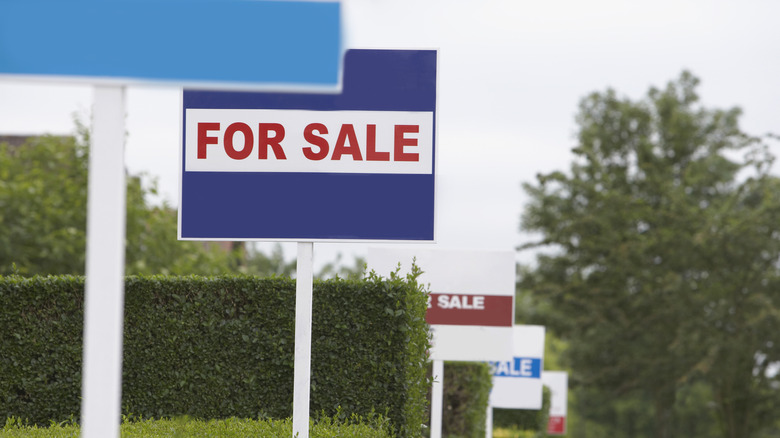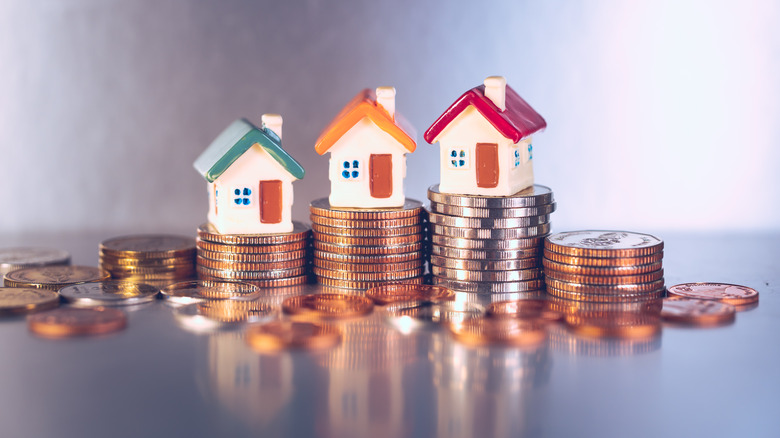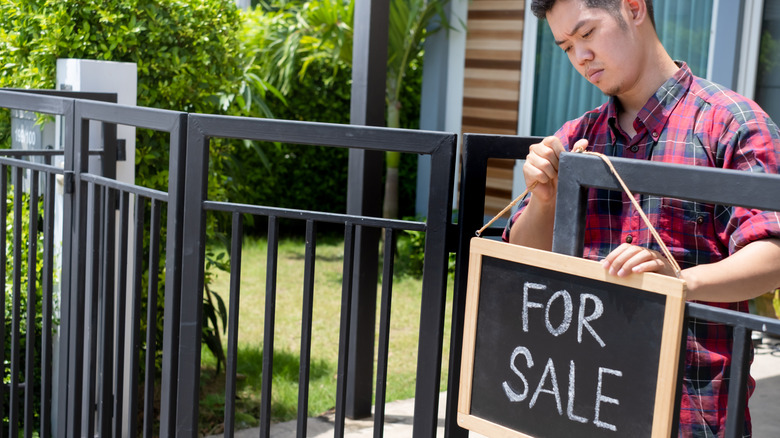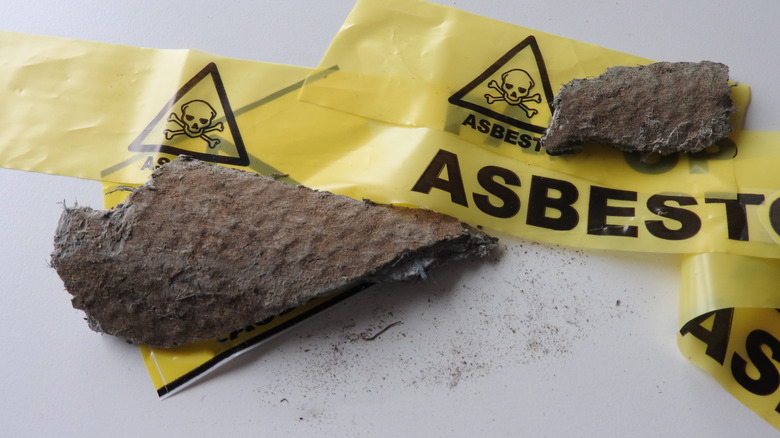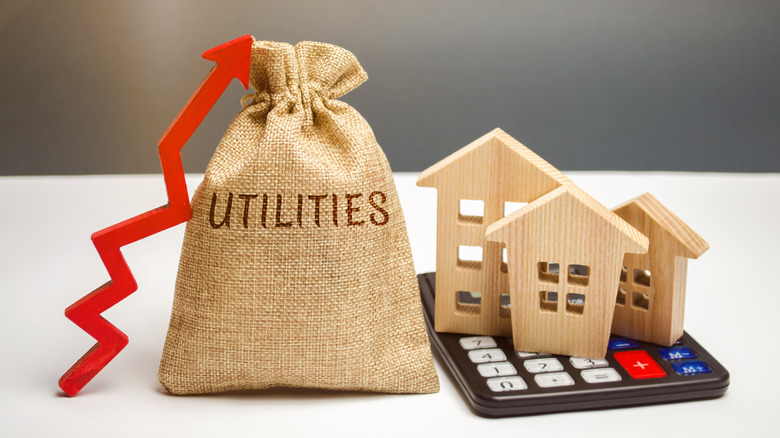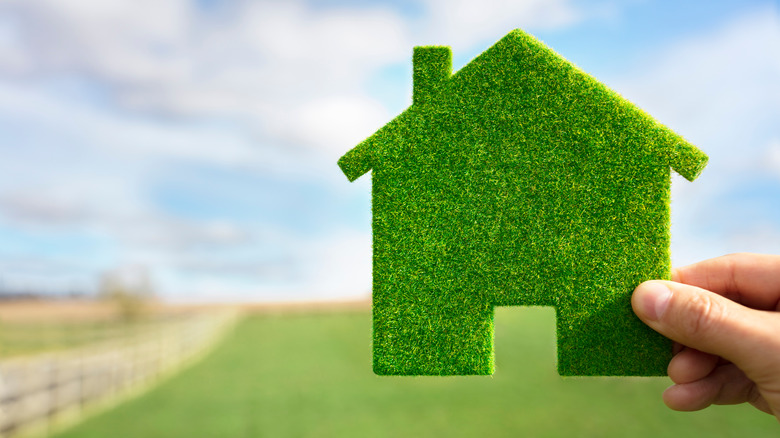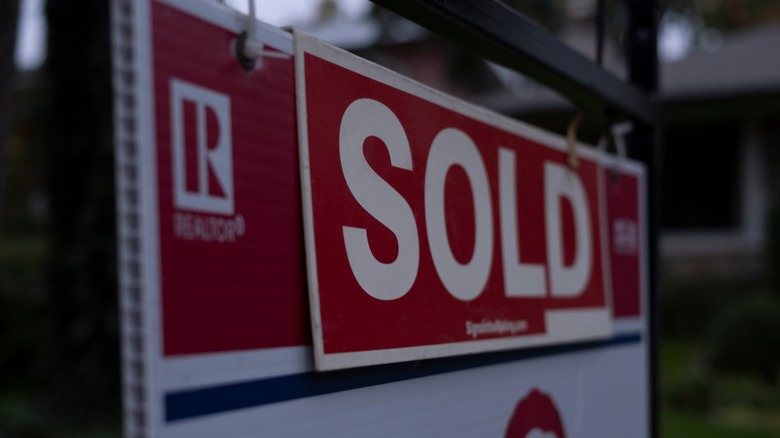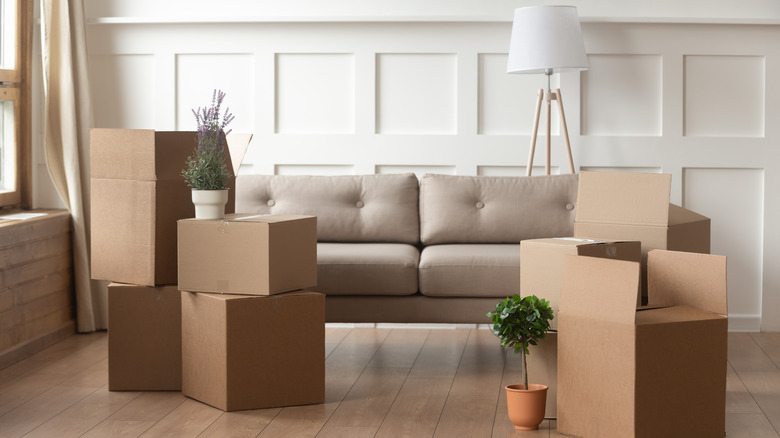The Drawbacks To Buying An Already Built Home
The property market always seems to be on the rise, particularly when it comes to already built homes. Despite new builds being attractive prospects for their customizability, state-of-the-art features, and modern architectural plans, there's an insatiable appetite for existing homes, clearly reflected in ever-increasing property prices. According to the National Association of Realtors, between 2020 to 2021, existing homes were so popular that the median sales price rose by an eye-watering 14%, with an increase of almost 2% alone in November 2021.
And we can understand why they're so popular. Already built homes give homeowners a certain amount of ease that new construction homes don't. They don't need to wait for construction to be completed, the neighborhoods are already established, and they have that all-important old-school charm that some new builds lack. But, as attractive as already built homes can be, it's important to recognize that buying an existing house can come with a surprising amount of drawbacks — and some of them could make you rethink signing the contract in the first place. Let's take a look at some of the negatives.
You'll probably have more upkeep
Sure, a little fixer-upper might be your idea of heaven, but it's vital not to underestimate how much work already built homes can need. When it comes to a lot of areas, "older homes are more affordable — but they come with an increased need for repairs and maintenance," Daniel Samalin, the chief executive of coaching firm Framework Ownership that helps first-time homebuyers, told Bankrate. A property's age is usually a good indicator of how much work it will need. The older the property is, the more expenditure on upkeep you'll have to account for (via American Family Insurance). While homes built within the last 10 years or so probably won't need many repairs, houses that are older by a few decades could seriously burn a hole in your pocket.
That's why Samalin warns, "budgeting for maintenance and repairs is critically important," and it's worth considering setting aside an extra bit of cash for after you buy an already built property for any immediate work needed. American Family Insurance also suggests investing in regular service checks to help keep costs down since hired professionals can spot and pre-empt repairs needed on your systems and appliances, avoiding a sudden (and costly!) need for a fix.
They may not be as cheap as you think
Common wisdom dictates that if you buy new, you pay more. It's true for most things in life, from laptops to cars to cell phones. But when it comes to housing, is that actually the case? Although new housing can frequently be more expensive than existing housing stock, already built homes have been seen sometimes to be even more costly than brand-new ones. According to Bloomberg, in March 2021, data from the National Association of Realtors indicated that a previously-owned single-family home had an average selling price of $334,500, which was slightly more expensive than the average cost of a new property, which sat at $330,800.
This price could be in part to the available housing stock when the data was collected, which was approximately 30% down from the same time the previous year. But this slightly unexpected price difference between old and new homes also serves to highlight a really important point, which is that it's unwise to assume that just because you're buying an already built house, you're paying less overall. And that's before you take into account any repairs that an older home could need. As always, it pays to research the housing market and shop around for the best deal.
Prices of already built homes are more affected by the neighboring houses
Buying an already built home set up in a well-established neighborhood can bring a host of positives. This includes providing a ready-made community for you to slide into, and amenities that are ready and waiting for you to take advantage of. But — and this is a big but — it also means that the price paid for a property isn't necessarily always established by the quality of the house itself, but by the quality of the homes around it.
In older neighborhoods, where homeowners have spent time and money improving their properties, this can cause a mismatch in pricing. If, for example, the house next to yours "has a brand new kitchen and baths and is 30 percent larger than your house and is a different design," then your property could become devalued by comparison, according to Appraisal Minnesota owner Carole Christensen, per U.S. News. On the flip side, if property prices have been driven up over time in a neighborhood, you may end up paying more for a home in one area than you would expect in a less developed one.
You might have fewer options to choose from
You might think that given the sheer amount of houses in the U.S., you'd be spoilt for choice if you're looking to buy an already built home. After all, there are well over 140 million housing units in the country as of 2020, according to Statista. However, the opposite might be true, thanks to potentially low housing inventory making it harder to get one's hands on a pre-owned house. "This low inventory has been out there as an issue since the financial crisis of 2008," Scott Lindner, TD Bank Mortgage's national sales director, told Bankrate.
This means, inevitably, that the available housing stock is getting older, and older stock is getting harder and harder to buy. Conversely, if you're willing to wait it out a little, buying a newly built property could make your life much easier. Buying a home that hasn't been built yet, or is in the process of being constructed, means that you could have a wider range of choices and more flexibility when it comes to creating options.
You might have to spend more on getting the house of your dreams
We've all seen those home-buying shows where, after viewing countless properties, the host suddenly unveils the final house, and the couple buying (usually with a dreamy look in their eye) say, "oh, it's perfect." They move in and live happily ever after. Job done.
That's great and all, but in reality, getting the house you've always dreamed of is hard work. Hard, expensive work. And when you're buying an already built home, it's even more challenging and more costly to renovate and restyle a property to get it to where you want it to be. The cost of a living room remodel alone, for example, was between $6,705 to 7,823 in 2020, according to Homewyse. You also might have multiple rooms in your property that you want to upgrade, meaning the cost of your home extends far beyond the initial purchase price. However, buying a new construction property gives you way more flexibility to adapt the house before the first brick is even laid, meaning that you know that when it's done, all you have to do is move in and kick your feet up.
You may make less of a profit when selling it
Already built homes can often have advantages regarding purchasing price, but this can come at a cost, quite literally, when you decide it's time to sell. "You can have more significant profits with the resale of your new home. A newer home is typically more appealing than an older home to most people," Guy Burtt, principal with construction company Riverstone Development Group, Inc., told Investopedia. This works in your favor if you're a new build homeowner and against you if you're trying to sell an older property.
What's more, several factors can see the resale value of new construction properties skyrocket beyond them just being newer, shinier, and in less need of repair. As HomeLight points out, holding on to a new build for a while, allowing both the market and the neighborhood around it to catch up and develop, can see you command an even higher price when you sell. However, with already built properties, what you see is often what you get.
It could have hidden factors that damage your health
The whole point of homes is to provide a safe refuge to ourselves and our families, so we wouldn't expect the house we buy to do the opposite. However, in some already built homes, that's precisely what can happen. As Bob Vila states, older homes can contain potentially harmful materials like lead-based paints, which can have a huge impact on health (and which, the CDC points out, are still present in approximately 24 million housing units across the U.S.). In older homes, you may also inherit drywall built with formaldehyde, carpets treated with toxic flame-retardant substances, or lumber treated with chemicals, all of which are more tightly regulated in new construction properties.
And that's all before considering arguably the biggest health hazard out there in older homes. Asbestos, a common feature in homes and other buildings built before the 1980s, and found in insulation and adhesives used around the house, can lead to cancer when exposed to it (via Asbestos.com). Despite asbestos being used in older home construction, only 7% of Americans have had their homes tested for asbestos, and over a quarter don't know if their home has ever been tested for it. If you suspect that your home's materials might contain asbestos, it's imperative to have it inspected immediately.
Your energy bills are going to cost more
If you thought that you might be saving money by buying an already built home, think again. When you opt for an older home, you also opt for a house that could be drafty and less secure, which will, in turn, lead you to pay a premium in your electric bills. "New homes are tight, and don't cost as much in terms of energy efficiency," Reuben Saltzman, a home inspection company owner, told HowStuffWorks. "There's a higher cost of extra energy expense in an old home."
Saltzman does point out, however, that newer homes tend to be way less durable than older properties, so there is something to be said for buying old and upgrading your energy efficiency. Having said that, Saltzman states that the very materials which make them durable, also make them more expensive to run. Take the walls, for example. "In new homes," says Saltzman, "walls don't let moisture leave, so they don't have the same drying potential. Old houses would leak a lot of air through the walls to dry them out." This not only leads to higher bills but also a higher likelihood that they'll need replacing sooner.
You may end up with hidden repairs on your hands
So, you've signed the contract, moved all your boxes in, and started to settle into your new house. But then, at some point down the line, you notice that the deck's paint is peeling, the ceiling is leaking, and you have a few less-than-welcome pests visiting your property. These issues may not be immediately apparent on viewing a home, but they're all things that home sellers can try and hide when showing you their property, according to Bob Vila. And they can leave you with a very costly job on your hands. Other things that can become apparent months after moving in are faulty drainage systems, a basement prone to flooding, and living in an area that's prone to noise pollution.
Suppose you find yourself in the unfortunate position of having to resolve undisclosed repairs or issues. In that case, it's important first to establish who's responsible for fixing them in the first place, ARAG Legal Insurance advises. If someone else is at fault, legal action may not be the easiest way to solve your problem. A demand letter or mediation are alternatives you should try before filing a lawsuit.
Your warranty might provide less coverage
Buying an existing home may not only leave you with more stuff to do in terms of upkeep and repairs, but it may also leave you with less coverage with which to do it. According to Angi, existing home warranties are less all-encompassing than the warranty you'd typically get with a new property. The former work on a tiered basis, starting with basic coverage for your essential systems like your plumbing, HVAC, water heater, and various appliances. You can then pay extra to cover additional items like a septic system or a pool, and you'll tend to have to renew any warranty on a year-by-year basis.
However, with a new construction home, your warranty coverage is far more extensive. In addition to one-year coverage for the base construction of the house, you'll also get a two-year warranty for your mechanical systems. On occasion, you'll also get a 10-year warranty to cover any unforeseen structural damage or problems with the home. And the likelihood is, you'll have to shell out less for repairs anyway with a new build, as everything's, well ... new.
Your home could be less eco-friendly
We all want our lifestyles to be a little friendlier to the environment. But this could be harder to achieve when buying an already built property. Your house might have been constructed when there was less consideration over a home's environmental impact. "Green appliances/Energy Star rated appliances, and more efficient toilets, plumbing fixtures, and electrical fixtures allow you to build 'green' for a more sustainable home in the long run," Guy Burtt told Investopedia, which most old homes lack. To add to this, new homes give you the capacity "to install, sleeve and/or wire for future technology upgrades, such as home automation and solar," Burtt explains.
In addition, older houses can also frequently be less energy efficient (via Pangea Builders). So not only are they more expensive, but they also take more energy to keep habitable, reducing their environmental credentials. If you've already signed the contract on your older home, however, never fear. It may be possible to retrofit your property to make it more eco-conscious.
There's more competition involved
It's a dog-eat-dog world out there, and this has never been truer than when it comes to real estate. Anyone who's ever tried to buy a property knows that houses disappear from the market as quickly as they arrive. If you're competing with other property buyers to try and secure an already built home, you need to move fast. In May 2021, the average time a house spent on the market was just ... wait for it ... six days, according to Zillow. There's no time to dawdle on those decisions, folks.
And if you're a first-time homebuyer, it's even more challenging. NerdWallet points towards the increasing unaffordability of homes for first-time buyers, which, coupled with less purchase history, makes their chances of outbidding or outshining more experienced homebuyers far less likely. However, buying a newly built property, particularly off-plan, can reduce the competition involved in purchasing a home. You usually have way more time and way less stress.
You may feel less at home
Of all the reasons why purchasing an already built home may not be the best option, this is probably the one that resonates with us the most. We all want our homes to feel like ours, but when you're dealing with a property that's belonged to countless people before you, that can sometimes be easier said than done. "There is a definite feeling of an emotional connection to living in a new home that you have created. The new-home smell, no one else has stepped foot (or pets) on your carpet," Guy Burtt told Investopedia. When you buy something new, you're the person who's made the first mark. "This is your creation that matches your style and personality, that you created from scratch," he explained.
However, it's important to note that creating a sense of home in an older property is far from impossible, and indeed, many people prefer an old-style house to a new build. But it's worth thinking about what will make you feel most at home in your own space. If it's something perfectly tailored to your tastes, a new construction home might be for you instead.
You may have fewer financing options
So, are you ready to have your mind blown? Okay, here goes. Buying a house is really expensive, folks. And for most people, they need all the help they can get. This is where one significant drawback lies in buying an already built house. Financing options can run a little thinner on the ground than if you were buying new.
As New American Funding indicates, new build homebuyers have a bevy of financing options that already built homebuyers don't. These can range from helping with the buyer's initial mortgage outgoings to covering certain taxes or closing costs. Building companies may also offer incentives through offering upgrades to the property or the materials used at no additional cost, giving you a better quality home for a lower price. All of the incentives that building companies offer will vary from firm to firm, but it goes without saying that if you're buying an older home off of the market, these perks aren't as available — and could leave you spending way more money.
